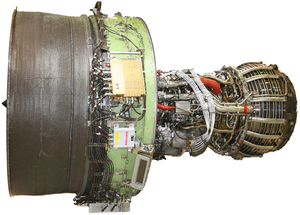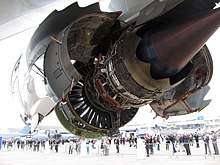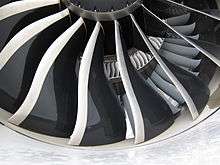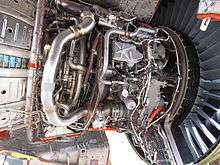General Electric GEnx
The General Electric GEnx ("General Electric Next-generation") is an advanced dual rotor, axial flow, high-bypass turbofan jet engine in production by GE Aviation for the Boeing 787 and 747-8. The GEnx is intended to succeed the CF6 in GE's product line.
| GEnx | |
|---|---|
 | |
| General Electric GEnx at the Paris Air Show 2009 | |
| Type | Turbofan |
| National origin | United States |
| Manufacturer | GE Aviation |
| First run | 2006 |
| Major applications | Boeing 747-8 Boeing 787 Dreamliner |
| Unit cost | 787-8 GEnx-1B: $25.6 million[1] 787-9 GEnx-1B: $28.7 million[2] 747-8 GEnx-2B: $22.5 million[3] |
| Developed from | General Electric GE90 |
| Developed into | CFM LEAP General Electric GE9X |
Development

The GEnx and the Rolls-Royce Trent 1000 were selected by Boeing following a run-off between the three big engine manufacturers. The GEnx uses some technology from the GE90 turbofan,[4] including swept composite fan blades and the 10-stage HPC featured in earlier variants of the engine. The engine carries composite technology[5] into the fan case.
The engine market for the 787 is estimated at US$40 billion over the next 25 years. A first is the elimination of bleed air systems using high temperature/high pressure air from the propulsion engines to power aircraft systems such as the starting, air-conditioning and anti-ice systems. Both engines enable the move towards the More Electric Aircraft, that is, the concept of replacing previously hydraulic and pneumatic systems with electrical ones to reduce weight, increase efficiency, and reduce maintenance requirements.
The GEnx was expected to produce thrust from 53,000 to 75,000 lbf (240 to 330 kN) with first tests commencing in 2006 and service entry by 2008 (delayed by 787 deliveries). Boeing predicts reduced fuel consumption of up to 20% and significantly quieter engines than current turbofans. A 66,500 lbf (296 kN) thrust version (GEnx-2B67) will be used on the 747-8. Unlike the initial version, for the 787, this version has a traditional bleed air system to power internal pneumatic and ventilation systems. It will also have a smaller overall diameter than the initial model to accommodate installation on the 747.
General Electric began initial test runs of the bleedless GEnx variant on 19 March 2006.[6] The first flight with one of these engines took place on 22 February 2007, using a Boeing 747-100, fitted with one GEnx engine in the number 2 (inboard left hand side) position.
By Fall 2019, General Electric was offering the GEnx-2B, developed for the 747-8, for the revised 767-XF variant based on the 767-400ER, but needed enough volume to cover the new product certification.[7]
Operational history
Introduced in late 2011 on a 747-8 freighter, Cargolux surpassed one million flight hours in early 2017.[8] In the summer of 2012, three engines suffered Low Pressure Turbine (LPT) failures. One failure was caused by an assembly problem, which led to inspections of all other engines then in service.[9]
During the spring and summer of 2013, GE learned of four 747-8F freighters that suffered icing in their engines at altitudes of 40,000 feet and above. The most serious incident involved an AirBridgeCargo freighter; on July 31, while at an altitude of 41,000 feet over China, the flight crew noted two engines surging while a third lost substantial power. The pilots were able to land the plane safely but the engines were found to have sustained damage. Among the possible factors cited was "'unique convective weather systems' such as unusually large thunderstorms reaching high altitudes." Boeing is working with GE on software solutions to the problem.[10] Altitude was restricted until GE changed the software to detect the high-altitude ice crystals and open bleed air valve doors to eject them before they enter the core.[8]
In March 2014, a GEnx-powered Boeing 787 had its first in-flight shut down in operation when a JAL flight had to divert to Honolulu after an oil pressure alert, bringing its in-flight shut down rate to 1 per 278,000 hours.[11] In January 2016 a Japan Airlines 787 had an inflight shutdown after flying through icing conditions, caused by ice formed on fan blades and ingested: the blades moved forward slightly and rubbed on the abradable seal in the casing.[8] In March 2016, the US FAA ordered emergency fixes on the GEnx-1B PIP2.[12] The airworthiness directive affects 43 Boeing 787 Dreamliners in the US.[13] Abradable material in the casing in front of the fan blades was ground to keep them from rubbing when ingesting ice or debris on 330 GEnx PIP-2.[8]
In early 2018, of 1277 orders for the B787, 681 selected the GEnx (53.3%), 420 the Rolls-Royce Trent 1000 (32.9%) and 176 were undecided (13.8%).[14] The 2,000th GEnx was delivered by November 2019, 15 years after the engine launch, as it logged 4.5 million flight cycles and 26 million hours among 60 operators.[15]
Design


The GEnx is derived from the GE90 with a fan diameter of 111.1 in (282 cm) for the 787 and 104.7 in (266 cm) for the 747-8. To reduce weight, it features 18 composite fan blades, a composite fan case and titanium aluminide stage 6 and 7 low-pressure turbine blades. Fuel efficiency is improved by 15% compared to the CF6, the bypass ratio reaches up to 9.0:1 and the overall pressure ratio up to 58.1:1. It has a 10 stage high-pressure compressor and is quieter, helped by larger, more efficient fan blades.[16]
It stays on wing 20% longer, uses 30% fewer parts to lower maintenance costs and has a contra-rotating architecture.[17] The Lean TAPS combustor reduces NOx gases with required pressure loss and backflow margin.[18]
Fan blades have steel alloy leading edges and the composite fan case reduces thermal expansion. To reduce fuel burn, the 23:1 pressure ratio high-pressure compressor is based on the GE90-94B, shrouded guide vanes reduce secondary flows and counter-rotating spools for the reaction turbines reduce load on guide vanes.[19]
To reduce maintenance cost and increase engine life, spools with lower parts count are achieved by using blisks in some stages, low blade counts in other stages and by using fewer stages; internal engine temperatures are reduced due to more efficient cooling techniques and debris extraction within the low-pressure compressor protects the high-pressure compressor.
Applications
Variants
| Designation | EASA certification | Continuous | Take-off rating |
|---|---|---|---|
| GEnx-1B | 29 March 2011 | ||
| GEnx-1B/P1 | 3 July 2012 | ||
| GEnx-1B/P2 | 24 June 2013 | ||
| GEnx-1B54/P2 | 250.4 kN (56,300 lbf) | 255.3 kN (57,400 lbf) | |
| GEnx-1B58/P2 | 271.3 kN (61,000 lbf) | ||
| GEnx-1B64/P2 | 273.6 kN (61,500 lbf) | 298.0 kN (67,000 lbf) | |
| GEnx-1B67/P2 | 17 May 2018 | 308.7 kN (69,400 lbf) | |
| GEnx-1B70/P2 | 295.8 kN (66,500 lbf) | 321.6 kN (72,300 lbf) | |
| GEnx-1B70/72/P2 | |||
| GEnx-1B70/75/P2 | |||
| GEnx-1B74/75/P2 | 305.2 kN (68,600 lbf) | 341.2 kN (76,700 lbf) | |
| GEnx-1B76/P2 | 349.2 kN (78,500 lbf) | ||
| GEnx-1B76A/P2 | |||
| GEnx-1B78/P2 | 357.6 kN (80,400 lbf) | ||
| GEnx-1B75/P2 | 306.0 kN (68,800 lbf) | 345.2 kN (77,600 lbf) | |
| GEnx-2B67 | 29 March 2011 | 260.2 kN (58,500 lbf) | 299.8 kN (67,400 lbf) |
| GEnx-2B67B/P2 | 21 October 2011 | ||
| GEnx-2B67/P | 24 January 2014 | ||
Specifications
_(cropped).jpg)
| Variant | -1B70 | -1B74/75 | -1B76/78 | -2B67B |
|---|---|---|---|---|
| Application | 787-8 | 787-9 | 787-10 | 747-8 |
| Fan Diameter | 111.1 in (282 cm) | 104.7 in (266 cm) | ||
| Compressor | 1 Fan 4 LP 10 HP | 1 Fan 3 LP 10 HP | ||
| Turbine | 2 HP 7 LP | 2 HP 6 LP | ||
| Takeoff thrust | 69,800 lbf (310 kN) | 74,100 lbf (330 kN) | 76,100 lbf (339 kN) | 66,500 lbf (296 kN) |
| Takeoff Bypass ratio | 9.0 | 8.8 | 8.8 | 8.0 |
| Top-of-climb OPR | 53.3 | 55.4 | 58.1 | 52.4 |
| Takeoff air per sec. | 2,559 lb (1,161 kg) | 2,624 lb (1,190 kg) | 2,658 lb (1,206 kg) | 2,297 lb (1,042 kg) |
| Flange to flange | 184.7 in (469 cm) | 169.7 in (431 cm) | ||
| Nominal RPM[22] | LP 2,560, HP 11,377 | LP 2,835, HP 11,377 | ||
| Dry weight[22] | 13,552 lb (6,147 kg) | 12,397 lb (5,623 kg) | ||
| Thrust/weight | 5.15 | 5.47 | 5.62 | 5.36 |
See also
Related development
Comparable engines
Related lists
References
- "Uzbekistan Airways Selects GEnx engines for Boeing 787 Dreamliners" (Press release). GE Aviation. September 20, 2017.
- "China Eastern Selects GEnx Engine to Power Its Boeing 787 Dreamliners" (Press release). GE Aviation. June 19, 2017.
- "Volga-Dnepr Group Signs MOU for Additional GEnx-Powered Boeing 747-8 Aircraft" (Press release). GE Aviation. June 17, 2015.
- "FAA Orders 'Urgent' 787 Repair After Engine Fails at 20,000 Feet". Bloomberg. Bloomberg. Retrieved 18 October 2018.
- "The Innovative 787 Carries Boeing, And Aviation, Ahead". Wired. Wired. Retrieved 18 October 2018.
- "General Electric Performs First Run of New GEnx Engine." Flight International. 21 March 2006.
- Guy Norris (Nov 15, 2019). "GE In Talks With Airbus Over Potential A350neo". Aviation Week.
- Sean Broderick (Aug 31, 2017). "Issues With Newest Engines Provide Early MRO-Proving Opportunities". Aviation Week Network.
- "GE identifies installation issue in GEnx, orders inspections". Flightglobal. Retrieved 6 October 2012.
- Pasztor, Andy (October 16, 2013). "Icing Hazards Surface on Boeing's Newest 747 Jet". Wall Street Journal. p. B3. Retrieved June 10, 2014.
- Stephen Trimble (9 March 2014). "GE-powered JAL 787 has in-flight shutdown". Flightglobal.
- "FAA orders engine icing fixes for GEnx-powered Boeing 787 Dreamliners". Aviation Safety Network. 2016-04-23.
- Patterson, Thom (April 23, 2016). "FAA Orders Urgent Fixes For Boeing 787 Dreamliners". CNN.
- "Airbus and Boeing are head-to-head in the widebody sector". Flightglobal. February 6, 2018.
- "GE wraps up GE9X trials as 777X flight tests near". Flightglobal. 18 Nov 2019.
- "The GEnx Commercial Aircraft Engine". GE Aviation.
- "GENX high bypass turbofan engines" (PDF). GE Aviation.
- General Electric (June 2013). "TAPS II Combustor Final Report" (PDF). Continuous Lower Energy, Emissions and Noise (CLEEN) Program. FAA.
- "Designing High-Tech Engines For Easier Maintenance". Aviation Week. Aviation Week. Retrieved 18 October 2018.
- "Type certificate data sheet" (PDF). EASA. 17 May 2018.
- "GENX high bypass turbofan engines" (PDF). GE Aviation. 11 Jan 2017.
- "Type certificate data sheet number E00078NE, Revision: 14" (PDF). FAA. June 20, 2016.
External links
| Wikimedia Commons has media related to General Electric GEnx. |
- Official website
- "General Electric's GEnx-1B engine for the Boeing 787 makes first flight on 747 testbed". Flight International. 23 Feb 2007.
- "GE plans mid-July nod for GEnx siblings". Flight International. 16 June 2010.